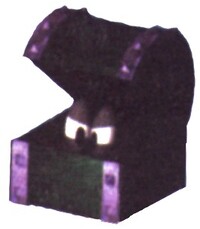Whuhoh: Difference between revisions
Mikan-chan (talk | contribs) mNo edit summary |
Annalisa10 (talk | contribs) Tag: Mobile edit |
||
| Line 25: | Line 25: | ||
|Jap=ナンダロナ | |Jap=ナンダロナ | ||
|JapR=Nandarona | |JapR=Nandarona | ||
|JapM=From「ナンダロウ」(''Nandarō'', [[Huhwhat#Names in other languages| | |JapM=From「ナンダロウ」(''Nandarō'', [[Huhwhat#Names in other languages|Huhwhat]]) and「な」(''-na'', a Japanese word used at sentence end) | ||
|Fre=Cocoffret | |Fre=Cocoffret | ||
|FreM=From "coffret" (little chest) | |FreM=From "coffret" (little chest) | ||
| Line 34: | Line 34: | ||
|Kor=머야 | |Kor=머야 | ||
|KorR=Meoya | |KorR=Meoya | ||
|KorM=From "머지" (''Meoji'', | |KorM=From "머지" (''Meoji'', Huhwhat) and "야" (''-ya'', a Korean word used at sentence end) | ||
|Spa=Chasquiflor | |Spa=Chasquiflor | ||
|SpaM= | |SpaM= | ||
Revision as of 07:36, November 23, 2023
| Whuhoh | |||
|---|---|---|---|

| |||
| First appearance | Super Mario RPG: Legend of the Seven Stars (1996) | ||
| Latest appearance | Super Mario RPG (Nintendo Switch) (2023) | ||
| Variant of | Chewy Huhwhat | ||
| |||
Whuhoh (originally known as Hidon) is a Chewy that is disguised as a green treasure box in Super Mario RPG: Legend of the Seven Stars. Its original name is a play on "hidden", referring to how its true form is enclosed within the chest until Mario strikes it from below and initiates the battle. Whuhoh also shares its original English name with a boss in Final Fantasy VI, another game by Square. Unlike the other enemies found in treasure boxes in the game, Whuhoh is only encountered once in the game. After defeating it, the player receives a large amount of experience points and coins, and can then find the Safety Badge inside Whuhoh's now-vacant treasure box. While hidden, only eyes are visible, despite the fact that Piranha Plants do not possess eyes.
Like its lookalikes Huhwhat, Pleaseno, and Comeon, Whuhoh is a powerful opponent, having both high attack and defense, as well as high HP and immunity to Thunder, Fire and Ice and all status ailments, although Mario's Jump attacks are very effective. Whuhoh's first action in battle is to release four Mini Goombas that are trapped inside of the chest ("Monsters are inside!") to assist it in battle; once they are all defeated, it releases another set.
If Whuhoh is targeted with a normal attack, it either attacks in return, or uses Carni-Kiss, which allows it to bite a party member for 2x the damage of its normal attack. The odds of each is 2/3 in favor of casting one of its normal attacks (Static Electricity, Willy Wisp and Flame Stone), and 1/3 in favor of using Carni-Kiss.
Profiles and statistics
Super Mario RPG: Legend of the Seven Stars
| Super Mario RPG: Legend of the Seven Stars enemy | |||||||||
|---|---|---|---|---|---|---|---|---|---|
| Hidon | |||||||||
| HP | 600 | FP | 100 | Speed | 1 | ||||
| Location(s) | Sunken Ship | Attack | 110 | Magic attack | 60 | ||||
| Role | Common | Defense | 90 | Magic defense | 30 | ||||
| Bonus Flower | Attack Up! (20%) | Yoshi Cookie | None | Morph rate | 0% | ||||
| Evade | 0% | Magic evade | 0% | Spells | Static E!, Willy Wisp, Flame Stone | ||||
| Weak | Jump | Strong | Fire, Thunder, Ice, Fear, Poison, Sleep, Mute, Critical | Sp. attacks | Carni-Kiss (CP) | ||||
| Coins | 100 | Exp. points | 50 | Items | None | ||||
| Psychopath | "You wanna run, huh?!" | ||||||||
Super Mario RPG (Nintendo Switch)
| Super Mario RPG enemy | |||||||||
|---|---|---|---|---|---|---|---|---|---|
| Whuhoh | |||||||||

|
HP | 600 | Weak Elements | Drops | N/A | ||||
| Exp. | 50 | Weak Statuses | N/A | Rare Drops | N/A | ||||
| Found in | Sunken Ship | ||||||||
| Monster List profile | Worried about what might be in the box? You should be—it's a Whuhoh! They're always watching you. | ||||||||
| Thought Peek | "I'm pretty strong, right? You're thinking about running away, right? Right?" | ||||||||
| Animations | |||||||||
Names in other languages
| Language | Name | Meaning | Notes |
|---|---|---|---|
| Japanese | ナンダロナ[?] Nandarona |
From「ナンダロウ」(Nandarō, Huhwhat) and「な」(-na, a Japanese word used at sentence end) | |
| French | Cocoffret[?] | From "coffret" (little chest) | |
| German | Blufftruhe[?] | Bluff Chest | |
| Italian | Scrignolo gnak[?] | Little-chest chomp; from "scrigno" ([treasure] chest) and the diminutive suffix "-olo" | |
| Korean | 머야[?] Meoya |
From "머지" (Meoji, Huhwhat) and "야" (-ya, a Korean word used at sentence end) | |
| Spanish | Chasquiflor[?] | ? |